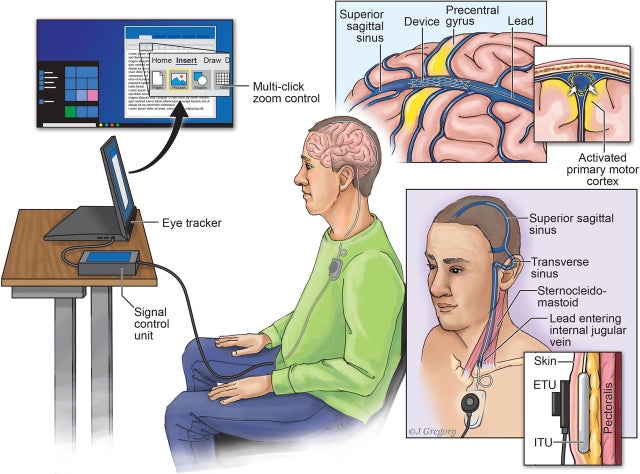"A team of scientists have managed to connect a human brain to a Windows 10 computer by threading a wire through a blood vessel.
Researchers from the University of Melbourne achieved the feat by inserting electrodes through the jugular vein in the neck and pushing them up to the brain’s primary motor cortex.
Once there, the electrodes were nestled into the wall of the blood vessel where they could detect brain signals and feed them back to a computer."
Read the article here.

Also read this article. Super interesting.
Researchers from the University of Melbourne achieved the feat by inserting electrodes through the jugular vein in the neck and pushing them up to the brain’s primary motor cortex.
Once there, the electrodes were nestled into the wall of the blood vessel where they could detect brain signals and feed them back to a computer."
Read the article here.

Also read this article. Super interesting.
Background Implantable brain–computer interfaces (BCIs), functioning as motor neuroprostheses, have the potential to restore voluntary motor impulses to control digital devices and improve functional independence in patients with severe paralysis due to brain, spinal cord, peripheral nerve or muscle dysfunction. However, reports to date have had limited clinical translation.
Methods Two participants with amyotrophic lateral sclerosis (ALS) underwent implant in a single-arm, open-label, prospective, early feasibility study. Using a minimally invasive neurointervention procedure, a novel endovascular Stentrode BCI was implanted in the superior sagittal sinus adjacent to primary motor cortex. The participants undertook machine-learning-assisted training to use wirelessly transmitted electrocorticography signal associated with attempted movements to control multiple mouse-click actions, including zoom and left-click. Used in combination with an eye-tracker for cursor navigation, participants achieved Windows 10 operating system control to conduct instrumental activities of daily living (IADL) tasks.
Results Unsupervised home use commenced from day 86 onwards for participant 1, and day 71 for participant 2. Participant 1 achieved a typing task average click selection accuracy of 92.63% (100.00%, 87.50%–100.00%) (trial mean (median, Q1–Q3)) at a rate of 13.81 (13.44, 10.96–16.09) correct characters per minute (CCPM) with predictive text disabled. Participant 2 achieved an average click selection accuracy of 93.18% (100.00%, 88.19%–100.00%) at 20.10 (17.73, 12.27–26.50) CCPM. Completion of IADL tasks including text messaging, online shopping and managing finances independently was demonstrated in both participants.
Conclusion We describe the first-in-human experience of a minimally invasive, fully implanted, wireless, ambulatory motor neuroprosthesis using an endovascular stent-electrode array to transmit electrocorticography signals from the motor cortex for multiple command control of digital devices in two participants with flaccid upper limb paralysis.





